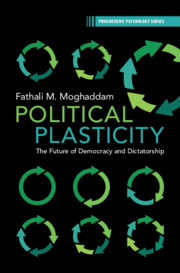Book contents
- Political Plasticity
- The Progressive Psychology Book Series
- Political Plasticity
- Copyright page
- Dedication
- Contents
- Figures
- Preface
- Acknowledgments
- Chapter 1 Political Plasticity, the Key to Understanding the Future of Democracy and Dictatorship
- Chapter 2 Hardwiring inside and outside People
- Part I Political Plasticity and Behavioral Continuity
- Chapter 3 Why Do Leaders Still Exist? Leadership and Followership
- Chapter 4 Rich and Poor – Still Just as Different
- Chapter 5 Ethnicity Is Forever
- Chapter 6 Religion, Eternally Present but with a Thousand Faces
- Chapter 7 The Built Environment and Behavioral Continuity
- Part II Change Agents, in Theory and Practice
- Part III Looking Ahead
- Notes
- References
- Index
Chapter 5 - Ethnicity Is Forever
from Part I - Political Plasticity and Behavioral Continuity
Published online by Cambridge University Press: 15 January 2023
- Political Plasticity
- The Progressive Psychology Book Series
- Political Plasticity
- Copyright page
- Dedication
- Contents
- Figures
- Preface
- Acknowledgments
- Chapter 1 Political Plasticity, the Key to Understanding the Future of Democracy and Dictatorship
- Chapter 2 Hardwiring inside and outside People
- Part I Political Plasticity and Behavioral Continuity
- Chapter 3 Why Do Leaders Still Exist? Leadership and Followership
- Chapter 4 Rich and Poor – Still Just as Different
- Chapter 5 Ethnicity Is Forever
- Chapter 6 Religion, Eternally Present but with a Thousand Faces
- Chapter 7 The Built Environment and Behavioral Continuity
- Part II Change Agents, in Theory and Practice
- Part III Looking Ahead
- Notes
- References
- Index
Summary
Ethnicity was supposed to become less and less important, as modernization and globalization take place. This chapter discusses how ethnicity has continued to be central to the lives of humans in the twenty-first century, and in some respects has become even more important. Ethnicity is often confused with race, even in academic research. Ethnicity is a social construct, whereas race is based on biological characteristics. Since the 1970s there has been ethnic mobilization and collective action in order to improve the conditions of disadvantaged ethnic groups. There has also been ethnic conflict and discrimination against ethnic minorities. Psychological research using the minimal group paradigm, as well as case studies of ethnic groups such as the Tutu and the Hutsi of Rwanda, demonstrates that there need only be minor or trivial differences between groups in order for individuals to show bias in favor of their ingroup. The arrival of large numbers of dissimilar others in North America and Western Europe has also added fuel to the fire of ethnic conflict.
Keywords
- Type
- Chapter
- Information
- Political PlasticityThe Future of Democracy and Dictatorship, pp. 48 - 60Publisher: Cambridge University PressPrint publication year: 2023



